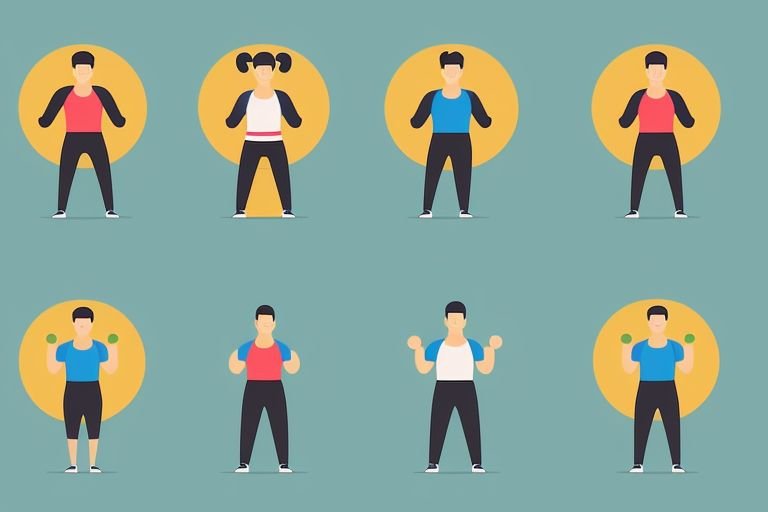A Roadmap to Healthier Living
Lifestyle plays a crucial role in our health, with many of our daily choices affecting our well-being. Researchers, including the World Health Organization, have found that a significant portion—60%—of health factors are linked to the way we live. Unhealthy habits can lead to serious health issues, underlining the importance of making positive lifestyle changes. Additionally, modern challenges pose new threats to our health, highlighting the need for awareness and proactive measures to promote healthier living.
This article delves into the intricate relationship between lifestyle and health. It emphasizes the impact of our daily habits on our overall well-being. By understanding the consequences of unhealthy behaviors and addressing emerging challenges, we can work towards fostering a healthier society for ourselves and future generations.
Living Well: Navigating Lifestyle Choices for Optimal Health
1. Diet and Body Mass Index (BMI)

The relationship between diet and health is undeniable. Our dietary choices not only affect our weight but also impact our overall health. Urban lifestyles often promote fast food consumption and reliance on processed foods. This leads to an increase in obesity rates and related health issues such as cardiovascular diseases and type 2 diabetes. For instance, in cities where access to fresh, nutritious foods is limited, individuals may resort to convenience foods high in calories, sugars, and unhealthy fats, contributing to poor health outcomes and rising rates of obesity.
2. Exercise

Regular physical activity is vital for maintaining good health. It not only strengthens our muscles and cardiovascular system but also boosts our mental well-being. Incorporating exercise into our daily routine can reduce the risk of chronic diseases such as heart disease, stroke, and certain cancers. For example, communities that prioritize physical activity by providing access to parks, recreational facilities, and safe walking paths often experience lower rates of obesity and related health problems compared to areas with limited opportunities for exercise.
3. Sleep

Quality sleep is essential for overall health and well-being. Lifestyle factors such as stress, irregular sleep schedules, and excessive screen time can disrupt our sleep patterns. This leads to sleep disorders like insomnia and sleep apnea. Poor sleep quality has been linked to various health problems, including obesity, diabetes, and depression. For instance, in societies where long work hours and technological distractions are the norm, individuals may struggle to get adequate sleep. Thus, increasing their risk of developing chronic health conditions.
4. Sexual Behavior

Healthy sexual relationships are an important aspect of overall well-being. Dysfunction in sexual health can lead to emotional distress, relationship problems, and increased risk of sexually transmitted infections (STIs). In societies where lack of education surrounds sexual health, individuals may face challenges in accessing appropriate care and support. For example, in communities where discussions about sex are taboo, individuals may hesitate to seek medical attention for STIs or sexual dysfunction. Hence, resulting in untreated health issues and negative impacts on overall well-being.
5. Substance Abuse

Substance abuse, including tobacco, alcohol, and illicit drugs, poses significant health risks. Addiction to these substances can lead to physical dependence, mental health problems, and social issues. In communities where substance use is normalized or culturally accepted, individuals may be more likely to engage in risky behaviors. For example, efforts to reduce tobacco use through public health campaigns and smoking cessation programs are essential. This can improve overall health outcomes and reducing the burden of tobacco-related diseases.
6. Medication Abuse

Misuse of medications is a widespread issue with serious health consequences. Practices such as self-medication, sharing medications, and using prescription drugs without medical supervision can lead to adverse reactions and drug interactions. In communities where access to healthcare is limited or where there is a lack of understanding about proper medication use, individuals may be at higher risk of medication abuse. For example, in areas with poor healthcare infrastructure, people may turn to self-medication as a way to manage health problems, leading to complications and worsening of conditions.
7. Application of Modern Technologies

While technology has made many aspects of life more convenient, excessive use can have negative effects on health. For example, spending too much time on electronic devices can lead to eye strain, disrupted sleep patterns, and sedentary behavior. In societies where technology is ubiquitous, finding a balance between the benefits and drawbacks of modern technology is essential for promoting overall health and well-being.
8. Recreation

Leisure activities are important for mental health and stress relief. Engaging in hobbies and recreational pursuits can improve mood, reduce anxiety, and enhance overall quality of life. However, in societies where leisure time is undervalued or where there are limited opportunities for recreation, individuals may experience higher levels of stress and burnout. For example, in communities where work is prioritized over leisure, individuals may neglect self-care activities, leading to negative impacts on physical and mental health.
9. Study

Lifelong learning is associated with better cognitive function and overall well-being. Education has been shown to reduce the risk of cognitive decline and dementia in later life. In societies where education is prioritized and accessible to all, individuals are more likely to engage in intellectual pursuits and lifelong learning. For example, in countries with robust education systems, older adults may participate in continuing education programs to stay mentally active and maintain cognitive function, leading to better overall health outcomes.
Conclusion
In essence, our lifestyle choices wield immense power over our health and well-being. From the food we eat to the activities we engage in, every decision shapes our path to either vitality or vulnerability. Understanding this connection empowers us to make informed choices, fostering a culture of health and resilience. Let’s embrace the journey towards wellness, mindful of the impact each choice holds, and strive to build a future where health is not just a goal but a way of life.
Leave a Reply